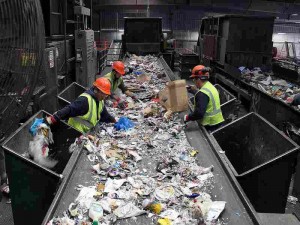The line between recyclables and trash
What is recyclable and what is trash? This is a question recycling utility owners find themselves asking more and more often. While it is common practice to recycle plastic soda bottles, detergent containers, and grocery bags, recently recycling facilities are having a tougher time determining what is worth recycling. It turns out that recycled plastics don’t always get reused: sometimes it makes more sense to send household recycling to the landfill than to sell them back to manufacturers. This means that some days a plastic soda bottle is recycled, while other days it is sent to the landfill.
So where is the line between trash and recycling? An episode of Planet Money, entitled Trash! explores the “graying” line between the two. While we normally think of recycling as a method to reduce our impact on the planet, the episode frames recycling as a hundred billion dollar a year industry. Recycling, just like any other business, depends on profit to endure; unfortunately, this means that if it’s cheaper to send plastics to the landfill than to sell them back to manufacturers, the choice is clear: landfill.
Recycling utility owners sort used plastics and sell them to manufacturing companies where used bottles and grocery bags are made into items like toothbrushes and containers. But if manufacturing companies can buy virgin plastics for cheaper than recycled plastics, they will. Recycling utilities are now losing customers, meaning that unwanted plastics are sent to the landfill.
What is the cause of this recycling “crisis”? The answer is simpler than it may seem, the drop in oil prices is largely responsible for the reduction in recycled plastics value. Plastic products are petroleum products, meaning that falling oil prices results in cheaper plastic. In fact when oil prices started dropping in June 2014 it became 5 cents cheaper, per pound, for manufacturers to purchase virgin plastic rather than recycled plastic, making it less economically feasible for recyclers to make a profit off of recycling plastic.
Recycling managers are now scrambling to find new approaches to encourage increased recycling while continuing to make a profit off of used plastics. If recycling is no longer cost effective, many municipalities may even stop mandating curbside collection of plastics (like what occurred in New York City about a decade ago when the City suspended the recycling of glass and plastic). As recycling plastics become more expensive, NYC will bear the burden of figuring out what to do with household recyclables. We certainly hope it doesn’t mean more landfilling!
Recyclers say that despite dropping prices higher quality plastics like laundry detergent bottles or kitchenware are still relatively easy to sell, while lower quality plastics especially plastic bags are posing a major problem. This is where the consumer comes into play.
There are a few ways we can help out recyclers and reduce the amount of plastic bags that end up in landfills. We should try to remember to bring reusable grocery bags when we make a trip to the store, cutting down on the number of bags we accumulate, or we should reuse the bags we have for their original purpose, as grocery bags.
We could also ask retailers and grocery stores if they take back their bags, or ask your local thrift store, library, or street market retailer if they could put them to use. And if you’re looking to be creative you could try repurposing your plastic bags–check out this website for a handful of ideas for how to turn used shopping bags into bracelets, lampshades, garden baskets, and more!





